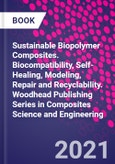Sustainable Biopolymer Composites: Biocompatibility, Self-healing, Modeling, Repair and Recyclability focuses on sustainable polymer composites also referred to as bio- composites. Vital aspects such as biodegradability, biocompatibility, repair and recyclability are discussed in detail. In addition, complexities like rapid and scalable processing, onsite repair, and minimal environmental effects are also covered along with the appropriateness of advanced polymer composites for structural applications in automotive, aviation and marine industries. This book will be an indispensable resource for scientists, engineers, physicists and chemists who are interested in the preparation, applications and repair analysis of bio-based composites and nano-composites for different types of applications.
The composites repair process is extremely complex, hence it is essential to have a comprehensive understanding of damage mechanisms to apply the most suitable repair technique. Damage assessment using onsite inspection, e.g., NDT, THz techniques and the automated repair process for reliability and repeatability, are vital parameters when executing bonded composite repair. Furthermore, overall integrity and structural health monitoring of composites repair is also necessary.
Please Note: This is an On Demand product, delivery may take up to 11 working days after payment has been received.
Table of Contents
Part I: Sustainable advanced composites materials: biomaterials, fabrication and properties1 An introduction to high-performance advanced polymers composites, their types, processing, and applications in automotive industries2 Biopolymers and sustainable biopolymer-based composites: fabrication, failure, and repairing3 Advanced biopolymer-based green composites: their processing and damage mechanism4 Mechanical and physical performance of the advanced biopolymer-based composites with addition of filler and challenges with additive manufacturing5 Advanced biopolymer-based composites: construction and structural applications6 Roadmap for materials selection, processing, and utilization of biocompatible composites in biomedical sectors
Part II: Sustainable advanced bio-polymer composites and analysis: fracture, repair and modelling, applications7 An introduction to self-healing of polymer composite materials and conventional repairing process8 Different types of self-repairing of composite materials: an overview9 Injection repair of advanced composites: a prospective method for delamination damage repair10 Advanced biopolymer-based composites: an introduction and fracture modeling11 Sustainable biocomposite development using halloysite nanotubes and polylactic acid12 Advanced composite repair technology for aerospace, marine, and automobile applications
Authors
Deepak Verma Assistant Professor, Department of Mechanical Engineering, Graphic Era Hill University, Dehradun, India. Deepak Verma is currently working as an Assistant Professor, in the Department of Mechanical Engineering, at Graphic Era Hill University, Dehradun, India. He received his M.Tech from the College of Technology, GBPUA&T Pantnagar, India. He has more than 7 years of experience in teaching, research, and working within industry. His research interests include: Hybrid Reinforced/Filled Polymer Composites, Advance Materials: Graphene and Nanoclay, Wood fiber Reinforced/Filled Polymer Composites, Modification and Treatment of Natural Fibres and Solid Wood Composites, and Polymer blends. He has published 2 books, 16 book chapters, and more than 10 International journal papers in reputed journals. Mohit Sharma A*STAR (Agency for Science, Technology and Research), Singapore. Dr Sharma's current assignments are focused on lead technology acquisition for advanced materials innovative. He has lead major research projects in liaison with key industries and high value ventures, which aims to create social impact and value capture. He is proficiently contributing to filing patents (US, Singapore), industrial know-hows, technology showcases and publishing peer reviewed research papers in the area of advanced composites materials, energy saving/heat regulating coatings and tribological materials. His current research interests are composites materials processing & analyses, Nano-structured fiber-polymer interphases, Carbon/glass/polymer/natural fibers reinforced nano-composites, Nano-ceramics/metal oxide based coatings for energy saving and UV shielding applications, Industrial coatings and paint additives, Aviation grease degradation and RUL, Solid lubricants, Tribological analysis of materials in harsh environments, advanced structural materials development for aerospace, marine offshore and biomedical arenas. Before joining A*STAR in 2013, Dr Sharma worked as a Guest Scientist at Leibniz Institute of Polymer Research (IPF) Dresden, Germany and Institute of Lightweight Structures and Polymer Technology (ILK) Technical University (TU) Dresden, Germany. Kheng-Lim Goh Director of Research and Associate Professor in Mechanics of Materials, Newcastle University of Singapore, Singapore. Prof Kheng-Lim Goh is the director of research at the Newcastle University of Singapore, and associate professor in mechanics of materials. He leads the Advanced Composite Research Group where the research is focused on the mechanics of composite materials, covering development (lightweight composite materials), damage studies and repair, sustainability (UN SDG, Net Zero), mechanical systems and structures underpinning composite materials, with applications from aerospace, to automotive, construction and biomedical industry. He has published 100+ research articles in several international journals, conference proceedings and book chapters. As a Global Engagement Fellow presently he is working with his colleagues at University of Pittsburg, USA, on materials and sustainability. Siddharth Jain Associate Professor, Department of Mechanical Engineering, College of Engineering Roorkee, Roorkee, India. Siddharth Jain is currently working as an Associate Professor, in the Department of Mechanical Engineering, College of Engineering Roorkee, Roorkee, India.He received his M.Tech and PhD from the Indian Institute of Technology, Roorkee in the area of thermal and renewable energy. After graduation from
IIT Roorkee, he worked for one year at the National University of Singapore, as a post-doctoral fellow and also worked for another year at the University
of Alberta, Canada, as a post-doctoral fellow on Renewable energy. The majority of his research has been devoted to investigate the production of power, fuel,
and chemicals from renewable energy resources, mainly: kinetic, and mechanism studies on biomass thermal conversion processes and integral
techno-economic and environmental assessment on renewable energy systems. Himani Sharma Assistant Professor and Head, Department of Physics, Doon University, Dehradun, India. Dr Himani Sharma has a strong research background of more than twelve year 12 years working in the areas of carbon nanotubes, carbon nanostructures, graphene, Raman spectroscopy and electron field emission. Presently, she is working in the area of energy harvesting materials, and photocatalysis on semiconducting materials. Dr Sharma received her PhD from the Indian Institute of Technology Delhi in 2012. She holds M. Tech degree in Materials Science and Engineering from Thapar University India, and MSc degree in Applied Physics from Kurukshetra University India.








